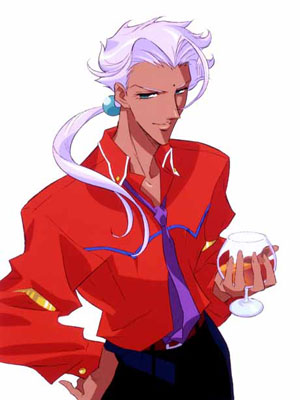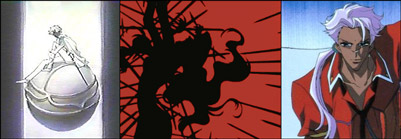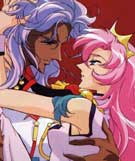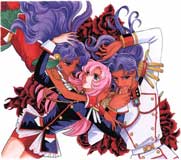

For the Power to Revolutionize the World... the Power of Dios.
From: Revolutionary Girl Utena (Chiho Saitoh & Be-Papas)
![]() Purity can be described as the absence of vice and malice. Most people are a mix of these and other components, balanced in some way to create a whole person with a soul and a conscience. But even so, is it possible to unmix a person into their constituent elements? Can the truth and the lies that shape a life be separated from one another to create two opposite beings? If such an unnatural process were performed, could the original being be reconstructed, thereby completing the cycle of creation and destruction?
Purity can be described as the absence of vice and malice. Most people are a mix of these and other components, balanced in some way to create a whole person with a soul and a conscience. But even so, is it possible to unmix a person into their constituent elements? Can the truth and the lies that shape a life be separated from one another to create two opposite beings? If such an unnatural process were performed, could the original being be reconstructed, thereby completing the cycle of creation and destruction?
![]() Such a philosophical quandary is both the plight and the pursuit of Ohtori Akio. He appears to be a debonair young man, drawing people to his side with his uncanny insight into human motivations and desires. He promises relatively little to his would-be followers. They are permitted to spend the whole of their prolonged existence seeking their heart's desire. In return, he gets their eternal loyalty and control over the quality and duration of their lives. If Akio decides that this one shall be admired and that one shunned, his followers accept his whim as though it were their own. Such people form the staff and student body of Akio's home, Ohtori Academy. (The Academy resembles the town-sized maze-like gardens of the old French royal court far more than the British-style boarding schools that share the designation.)
Such a philosophical quandary is both the plight and the pursuit of Ohtori Akio. He appears to be a debonair young man, drawing people to his side with his uncanny insight into human motivations and desires. He promises relatively little to his would-be followers. They are permitted to spend the whole of their prolonged existence seeking their heart's desire. In return, he gets their eternal loyalty and control over the quality and duration of their lives. If Akio decides that this one shall be admired and that one shunned, his followers accept his whim as though it were their own. Such people form the staff and student body of Akio's home, Ohtori Academy. (The Academy resembles the town-sized maze-like gardens of the old French royal court far more than the British-style boarding schools that share the designation.)
![]() Using his students as test subjects, Akio carries out elaborate behavioral experiments with a single aim. He fervently wishes to join with that counter-aspect of himself lost long ago, Dios. Dios is everything that Akio is not and cannot become again. In a realm somehow connected to the limbo that is Ohtori Academy, Dios exists in isolated solitude, eternally young and innocent. In that odd place caught out of time, he preserves the tormented spirit of his sister as she was at the moment of his division.
Using his students as test subjects, Akio carries out elaborate behavioral experiments with a single aim. He fervently wishes to join with that counter-aspect of himself lost long ago, Dios. Dios is everything that Akio is not and cannot become again. In a realm somehow connected to the limbo that is Ohtori Academy, Dios exists in isolated solitude, eternally young and innocent. In that odd place caught out of time, he preserves the tormented spirit of his sister as she was at the moment of his division.
![]() Before separation, Dios was revered and hailed as a prince among the people and was often called upon as a healer and savior. Selfless in the extreme, Dios sacrificed his desires and health in order to serve the common people around him. When he was unable to serve them and they still demanded more, his sister tried to protect him and was slaughtered. Having lived for the benefit of others until it killed him and his sister, the vengeful anger in Dios erupted to become the torturer Akio.
Before separation, Dios was revered and hailed as a prince among the people and was often called upon as a healer and savior. Selfless in the extreme, Dios sacrificed his desires and health in order to serve the common people around him. When he was unable to serve them and they still demanded more, his sister tried to protect him and was slaughtered. Having lived for the benefit of others until it killed him and his sister, the vengeful anger in Dios erupted to become the torturer Akio.

![]() In direct contrast to the being he used to be, Akio is completely self-absorped. He cares little for those under his protection, and bears a special contempt for his sister Anthy. Distorting the noble love they once shared, he keeps her in thrall as his sexual slave and does all he can to make her miserable and unhappy. With his horde of sworn subjects, he is still hailed as a prince, but there is much fear mingled in the adoring smiles of the students. Where Dios comforted and healed the sick, Akio feeds on weakness and insecurity, nurturing only his lust for absolute power.
In direct contrast to the being he used to be, Akio is completely self-absorped. He cares little for those under his protection, and bears a special contempt for his sister Anthy. Distorting the noble love they once shared, he keeps her in thrall as his sexual slave and does all he can to make her miserable and unhappy. With his horde of sworn subjects, he is still hailed as a prince, but there is much fear mingled in the adoring smiles of the students. Where Dios comforted and healed the sick, Akio feeds on weakness and insecurity, nurturing only his lust for absolute power.
![]() Akio's power to manipulate others is vast, but limited. In truth, much of the strength he once had was the result of the faith and hope he inspired in others as the noble and long-suffering Dios. Lacking that selfless love of all beings, the limitless power is lost to Akio and resides in the "new" Dios of the shadow-realm. If that lost soul might be persuaded to yield its power to another person, then Akio might draw upon it by controlling its new bearer. This goal is at the root of all of Akio's schemes.
Akio's power to manipulate others is vast, but limited. In truth, much of the strength he once had was the result of the faith and hope he inspired in others as the noble and long-suffering Dios. Lacking that selfless love of all beings, the limitless power is lost to Akio and resides in the "new" Dios of the shadow-realm. If that lost soul might be persuaded to yield its power to another person, then Akio might draw upon it by controlling its new bearer. This goal is at the root of all of Akio's schemes.

![]() For the purpose of finding someone who can coax out the power of Dios, Akio has gifted his most devoted followers with some part of his power. These disciples, the Student Council, use that power to locate spirits of pure heart and good intent who might satisfy Akio's needs. Within the proving ground of the Academy, the Council subjects these candidates to physical and emotional trials that test the depth of their selfless love for others. Pitted against their friends and the Student Councillors in contests for dominance and survival, each Duel won strips away a little more of a candidate's resistance and puts them further under Akio's control. The motivation to continue the struggle is provided by Anthy as the Rose Bride, a subservient victim subject to the whim of whoever wins each Duel. The members of the Council covet Anthy and confer exalted status upon whoever possesses her.
For the purpose of finding someone who can coax out the power of Dios, Akio has gifted his most devoted followers with some part of his power. These disciples, the Student Council, use that power to locate spirits of pure heart and good intent who might satisfy Akio's needs. Within the proving ground of the Academy, the Council subjects these candidates to physical and emotional trials that test the depth of their selfless love for others. Pitted against their friends and the Student Councillors in contests for dominance and survival, each Duel won strips away a little more of a candidate's resistance and puts them further under Akio's control. The motivation to continue the struggle is provided by Anthy as the Rose Bride, a subservient victim subject to the whim of whoever wins each Duel. The members of the Council covet Anthy and confer exalted status upon whoever possesses her.
![]() Any person who successfully survives the gauntlet of the Duels loses much of their purity of spirit along the way. Protecting the girl Anthy becomes less important than retaining possession of the Rose Bride and the prestige she brings. And any power bestowed temporarily by Dios fuels an increasing greed for more power. Through his agents, Akio molds each candidate in his own image, encouraging them in acts of selfishness and malice while preserving their self-delusion of good motivations. Ultimately, Akio guides his creation in a mockery of those events that led to his own "birth". The candidate must willingly subject the once-protected Anthy to torture and sacrifice in order to preserve his or her selfish desires. (It's a lot like the re-education process of Orwell's "1984", only with different symbolic images.)
Any person who successfully survives the gauntlet of the Duels loses much of their purity of spirit along the way. Protecting the girl Anthy becomes less important than retaining possession of the Rose Bride and the prestige she brings. And any power bestowed temporarily by Dios fuels an increasing greed for more power. Through his agents, Akio molds each candidate in his own image, encouraging them in acts of selfishness and malice while preserving their self-delusion of good motivations. Ultimately, Akio guides his creation in a mockery of those events that led to his own "birth". The candidate must willingly subject the once-protected Anthy to torture and sacrifice in order to preserve his or her selfish desires. (It's a lot like the re-education process of Orwell's "1984", only with different symbolic images.)

![]() By replaying his old life as Dios through a more cynical lens, Akio hopes to extinguish the hope that sustains the new Dios and catalyze a re-integration of the two beings. Although unsuccessful, each attempt provides Akio with new insight and resolve towards achieving the prize. On the flip side, his disciples grow increasingly desperate and rebellious with each failed enterprise. Only a need to have Akio fulfill their impossible desires keeps them in his painful embrace. If they sought the power they needed in themselves or abandoned their wishes, it's possible that the Student Council might "graduate" from Ohtori Academy and free themselves from Akio's influence. Anthy, Akio's chief disciple and most abject slave, had reached that conclusion herself at the close of both the TV series and the movie, although her fate beyond the Academy is unknown.
By replaying his old life as Dios through a more cynical lens, Akio hopes to extinguish the hope that sustains the new Dios and catalyze a re-integration of the two beings. Although unsuccessful, each attempt provides Akio with new insight and resolve towards achieving the prize. On the flip side, his disciples grow increasingly desperate and rebellious with each failed enterprise. Only a need to have Akio fulfill their impossible desires keeps them in his painful embrace. If they sought the power they needed in themselves or abandoned their wishes, it's possible that the Student Council might "graduate" from Ohtori Academy and free themselves from Akio's influence. Anthy, Akio's chief disciple and most abject slave, had reached that conclusion herself at the close of both the TV series and the movie, although her fate beyond the Academy is unknown.
![]() I propose as an ironic epilogue that Akio would be helplessly crippled by the loss of his dependent supporters just as Dios of the past was crushed by the onslaught of too many people willing to be dependent on him. It's probable that Akio must accept his need to aid others, as well as his desire to subjugate them, in order to achieve the unity he obsessesively seeks.
I propose as an ironic epilogue that Akio would be helplessly crippled by the loss of his dependent supporters just as Dios of the past was crushed by the onslaught of too many people willing to be dependent on him. It's probable that Akio must accept his need to aid others, as well as his desire to subjugate them, in order to achieve the unity he obsessesively seeks.